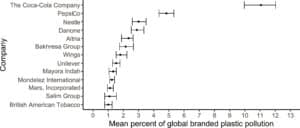The Laundromat’s dedication to chasing down all things plastic pollution may be reaching obsession level at this point. At time of writing the powers that be are gathered in Ottawa tasked with hammering out a semi-decent draft of the Global Plastics Treaty that it is hoped will be agreed and implemented next year. Delegates at this fourth Intergovernmental Negotiating Committee (INC-4) are keen to get to work on the actual treaty text, which was one of the objectives of INC-3 that failed to materialise. The so-called zero draft working document is apparently still a mess of multiple options that needs to be drastically narrowed down.
The presence of plastics industry lobbyists at previous sessions was a serious cause for concern, given the tendency for loophole-friendly “weasel words” to sneak their way into these global sustainability agreements and grand-sounding joint conference statements. The number of fossil fuel and petrochemical industry affiliated delegates is up more than a third in Ottawa, with almost 200 of them swarming the event. As readers of this column will be well aware, the fossil fuel industry is doubling down on plastics as a means to compensate for an eventual decline in global oil and gas consumption. They are big fans of recycling, which is a shambolic scam (Cf. many recent Laundromats).
Meanwhile, the Usual Suspects were featuring in new research on plastic pollution published on Wednesday 24 April. This detailed study of the mountains of rubbish found on beaches, rivers, and shorelines around the globe reveals that just 60 companies are behind half of the world’s plastic pollution. Worryingly, the researchers found that half of the plastic waste is unbranded and cannot be linked to its source company. There is clearly a need for some sort of permanent marking on plastic packaging to improve transparency and traceability. However, even those companies that are easily identifiable as veritable firehoses of plastic muck do not seem that bothered. INC-4 and the ‘last-chance-saloon’ INC-5 must impose clear extended producer responsibility (EPR) on these firms. Last week’s Laundromat featured virgin plastic-spewing volcano ExxonMobil’s staggering belief that taxpayers should simply pay for better recycling.
Who are the Usual Suspects? A search for Coca Cola on the NordSIP platform will produce multiple Laundromat hits, not just regarding plastic pollution but also for their flabbergastingly odd sponsorship of COP27. Why anyone keeps this company in their investment portfolio is beyond me. If you exclude the likes of ConocoPhillips and Chevron, then this ubiquitous fizzy drink peddler has to go too. The Top 5 companies in the table below account for a quarter of all the plastic pollution identified in the survey. The first four are Laundromat regulars (e.g. do not get me started on Nestlé), but there is also Altria (née Philip Morris). Surely renaming a cigarette company to sound altruistic should solve everything. Unfortunately not, as Altria’s cigarette butts and packets continue to litter the world, especially in developing countries. Sustainability leader Paul Polman will likely also be frustrated to see his old company Unilever falling off the plastics wagon and producing record amounts of single-use plastic sachets to earn its place in this infamous Top 10.

Source: Win Cowger et al. Global producer responsibility for plastic pollution. Sci. Adv.10, eadj8275(2024). DOI:10.1126/sciadv.adj8275
Meanwhile, across the pond the European Union was busy punching gaping holes in its new Packaging and Packaging Waste Regulation (PPWR). The EU parliament failed to accept the recommendations of its own Committee on the Environment, Public Health and Food Safety (ENVI) calling for a clear methodology for calculating recycled plastic content in single-use plastics. Lauriane Veillard, Chemical Recycling and Plastic-to-Fuels Policy Officer at Zero Waste Europe said: “The European Parliament today may as well have voted blindfolded. They have ignored the loud and clear concerns of environmentalist voices. By rejecting this resolution, MEPs are essentially handing European consumers an umbrella full of holes in a rainstorm of greenwashing. It’s more than a missed opportunity–it’s a direct hit against consumers, SMEs, and local recycling businesses.” The Laundromat can only stand back in admiration and sympathy at this highly poetic expression of frustrated anger. Let us hope for some good news (and a change of subject for the Laundromat) when INC-4 finishes in Ottawa on Monday 29 April.


